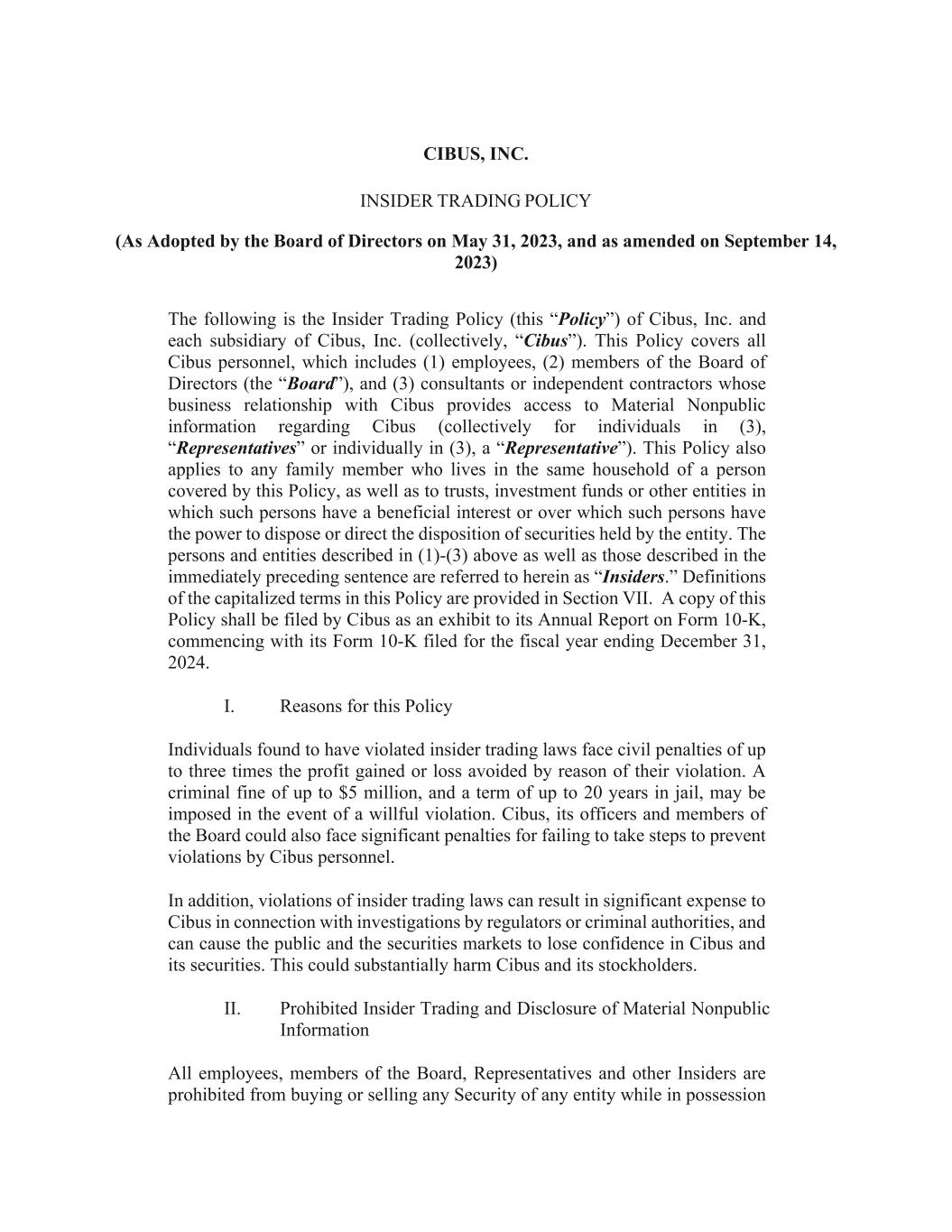
CIBUS, INC. INSIDER TRADING POLICY (As Adopted by the Board of Directors on May 31, 2023, and as amended on September 14, 2023) The following is the Insider Trading Policy (this “Policy”) of Cibus, Inc. and each subsidiary of Cibus, Inc. (collectively, “Cibus”). This Policy covers all Cibus personnel, which includes (1) employees, (2) members of the Board of Directors (the “Board”), and (3) consultants or independent contractors whose business relationship with Cibus provides access to Material Nonpublic information regarding Cibus (collectively for individuals in (3), “Representatives” or individually in (3), a “Representative”). This Policy also applies to any family member who lives in the same household of a person covered by this Policy, as well as to trusts, investment funds or other entities in which such persons have a beneficial interest or over which such persons have the power to dispose or direct the disposition of securities held by the entity. The persons and entities described in (1)-(3) above as well as those described in the immediately preceding sentence are referred to herein as “Insiders.” Definitions of the capitalized terms in this Policy are provided in Section VII. A copy of this Policy shall be filed by Cibus as an exhibit to its Annual Report on Form 10-K, commencing with its Form 10-K filed for the fiscal year ending December 31, 2024. I. Reasons for this Policy Individuals found to have violated insider trading laws face civil penalties of up to three times the profit gained or loss avoided by reason of their violation. A criminal fine of up to $5 million, and a term of up to 20 years in jail, may be imposed in the event of a willful violation. Cibus, its officers and members of the Board could also face significant penalties for failing to take steps to prevent violations by Cibus personnel. In addition, violations of insider trading laws can result in significant expense to Cibus in connection with investigations by regulators or criminal authorities, and can cause the public and the securities markets to lose confidence in Cibus and its securities. This could substantially harm Cibus and its stockholders. II. Prohibited Insider Trading and Disclosure of Material Nonpublic Information All employees, members of the Board, Representatives and other Insiders are prohibited from buying or selling any Security of any entity while in possession
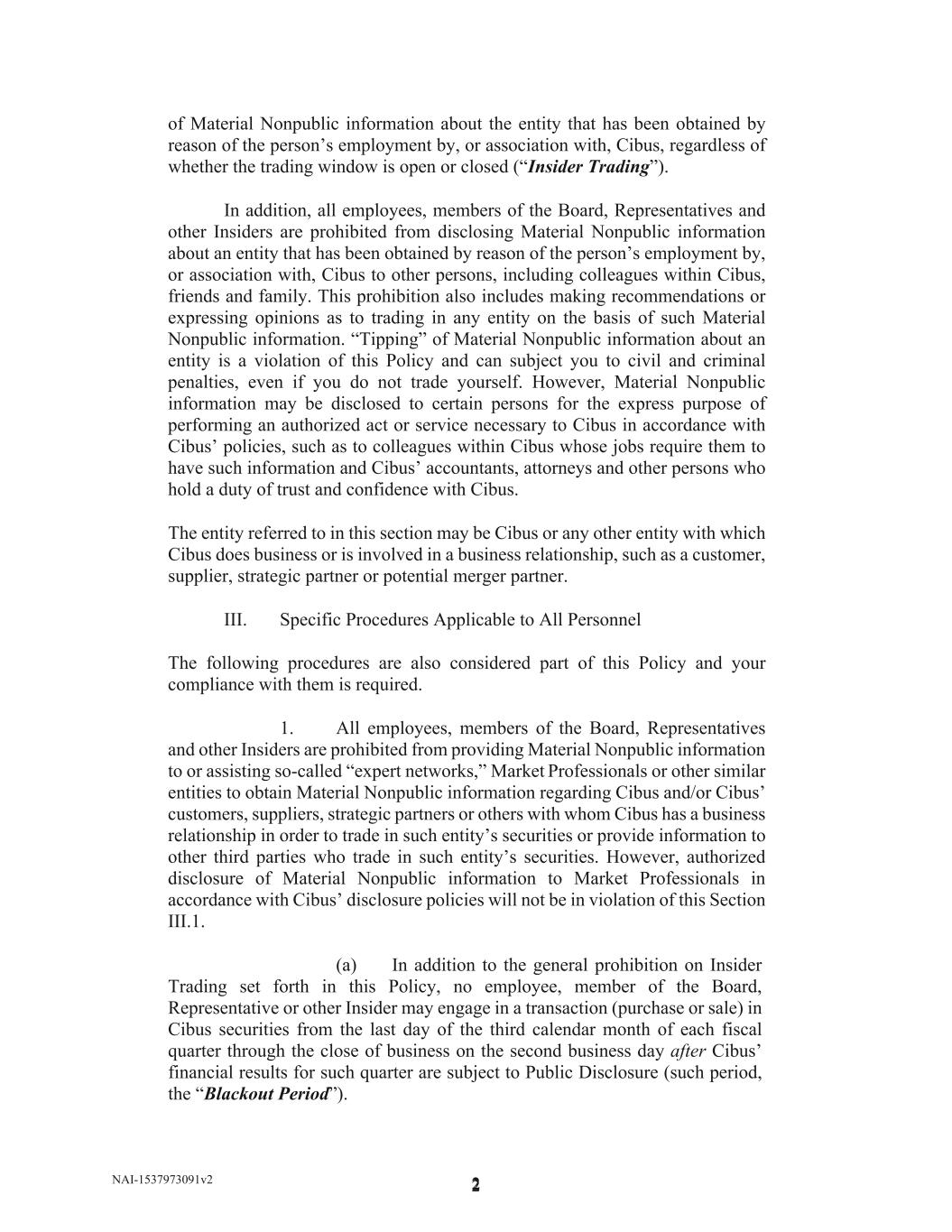
2 NAI-1537973091v2 of Material Nonpublic information about the entity that has been obtained by reason of the person’s employment by, or association with, Cibus, regardless of whether the trading window is open or closed (“Insider Trading”). In addition, all employees, members of the Board, Representatives and other Insiders are prohibited from disclosing Material Nonpublic information about an entity that has been obtained by reason of the person’s employment by, or association with, Cibus to other persons, including colleagues within Cibus, friends and family. This prohibition also includes making recommendations or expressing opinions as to trading in any entity on the basis of such Material Nonpublic information. “Tipping” of Material Nonpublic information about an entity is a violation of this Policy and can subject you to civil and criminal penalties, even if you do not trade yourself. However, Material Nonpublic information may be disclosed to certain persons for the express purpose of performing an authorized act or service necessary to Cibus in accordance with Cibus’ policies, such as to colleagues within Cibus whose jobs require them to have such information and Cibus’ accountants, attorneys and other persons who hold a duty of trust and confidence with Cibus. The entity referred to in this section may be Cibus or any other entity with which Cibus does business or is involved in a business relationship, such as a customer, supplier, strategic partner or potential merger partner. III. Specific Procedures Applicable to All Personnel The following procedures are also considered part of this Policy and your compliance with them is required. 1. All employees, members of the Board, Representatives and other Insiders are prohibited from providing Material Nonpublic information to or assisting so-called “expert networks,” Market Professionals or other similar entities to obtain Material Nonpublic information regarding Cibus and/or Cibus’ customers, suppliers, strategic partners or others with whom Cibus has a business relationship in order to trade in such entity’s securities or provide information to other third parties who trade in such entity’s securities. However, authorized disclosure of Material Nonpublic information to Market Professionals in accordance with Cibus’ disclosure policies will not be in violation of this Section III.1. (a) In addition to the general prohibition on Insider Trading set forth in this Policy, no employee, member of the Board, Representative or other Insider may engage in a transaction (purchase or sale) in Cibus securities from the last day of the third calendar month of each fiscal quarter through the close of business on the second business day after Cibus’ financial results for such quarter are subject to Public Disclosure (such period, the “Blackout Period”).
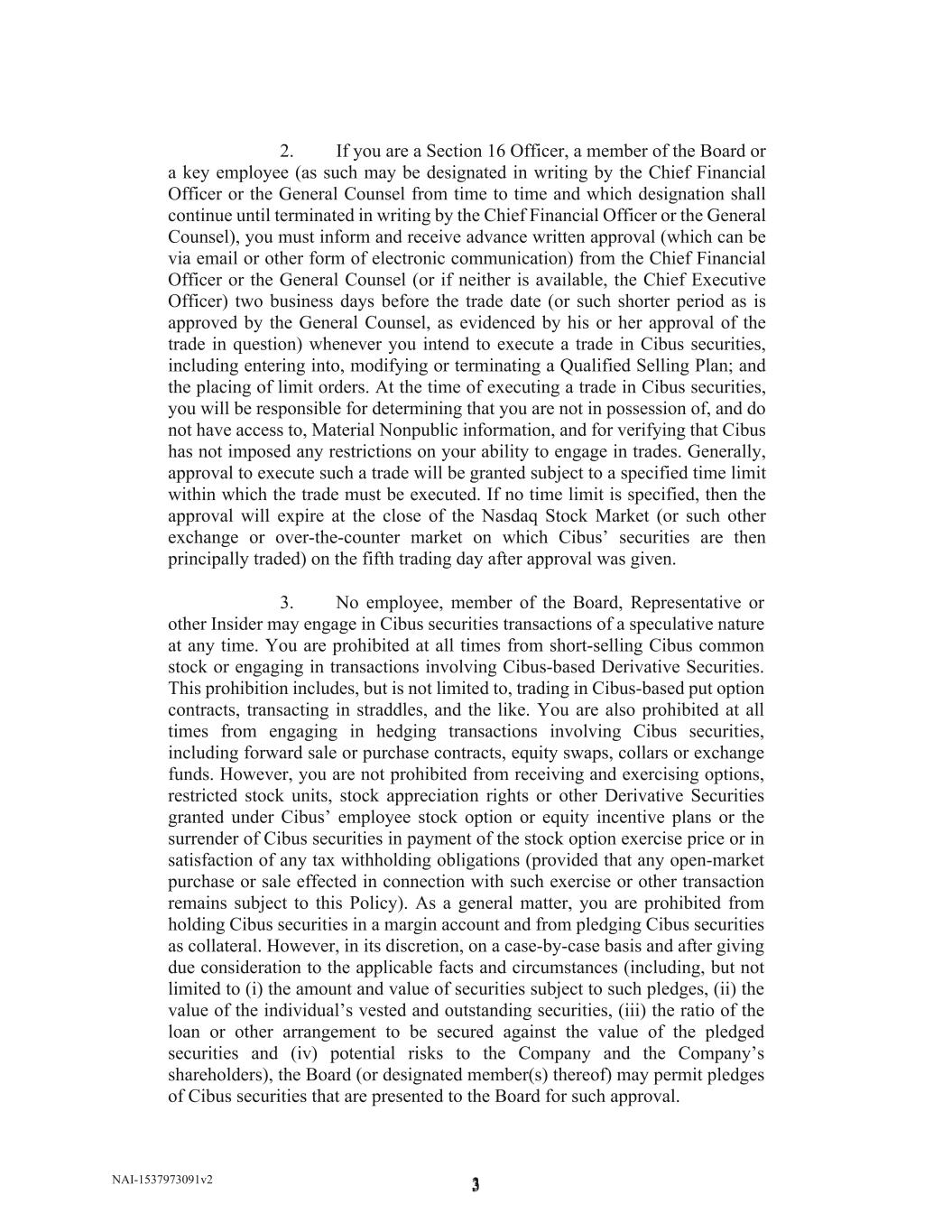
3 NAI-1537973091v2 2. If you are a Section 16 Officer, a member of the Board or a key employee (as such may be designated in writing by the Chief Financial Officer or the General Counsel from time to time and which designation shall continue until terminated in writing by the Chief Financial Officer or the General Counsel), you must inform and receive advance written approval (which can be via email or other form of electronic communication) from the Chief Financial Officer or the General Counsel (or if neither is available, the Chief Executive Officer) two business days before the trade date (or such shorter period as is approved by the General Counsel, as evidenced by his or her approval of the trade in question) whenever you intend to execute a trade in Cibus securities, including entering into, modifying or terminating a Qualified Selling Plan; and the placing of limit orders. At the time of executing a trade in Cibus securities, you will be responsible for determining that you are not in possession of, and do not have access to, Material Nonpublic information, and for verifying that Cibus has not imposed any restrictions on your ability to engage in trades. Generally, approval to execute such a trade will be granted subject to a specified time limit within which the trade must be executed. If no time limit is specified, then the approval will expire at the close of the Nasdaq Stock Market (or such other exchange or over-the-counter market on which Cibus’ securities are then principally traded) on the fifth trading day after approval was given. 3. No employee, member of the Board, Representative or other Insider may engage in Cibus securities transactions of a speculative nature at any time. You are prohibited at all times from short-selling Cibus common stock or engaging in transactions involving Cibus-based Derivative Securities. This prohibition includes, but is not limited to, trading in Cibus-based put option contracts, transacting in straddles, and the like. You are also prohibited at all times from engaging in hedging transactions involving Cibus securities, including forward sale or purchase contracts, equity swaps, collars or exchange funds. However, you are not prohibited from receiving and exercising options, restricted stock units, stock appreciation rights or other Derivative Securities granted under Cibus’ employee stock option or equity incentive plans or the surrender of Cibus securities in payment of the stock option exercise price or in satisfaction of any tax withholding obligations (provided that any open-market purchase or sale effected in connection with such exercise or other transaction remains subject to this Policy). As a general matter, you are prohibited from holding Cibus securities in a margin account and from pledging Cibus securities as collateral. However, in its discretion, on a case-by-case basis and after giving due consideration to the applicable facts and circumstances (including, but not limited to (i) the amount and value of securities subject to such pledges, (ii) the value of the individual’s vested and outstanding securities, (iii) the ratio of the loan or other arrangement to be secured against the value of the pledged securities and (iv) potential risks to the Company and the Company’s shareholders), the Board (or designated member(s) thereof) may permit pledges of Cibus securities that are presented to the Board for such approval.
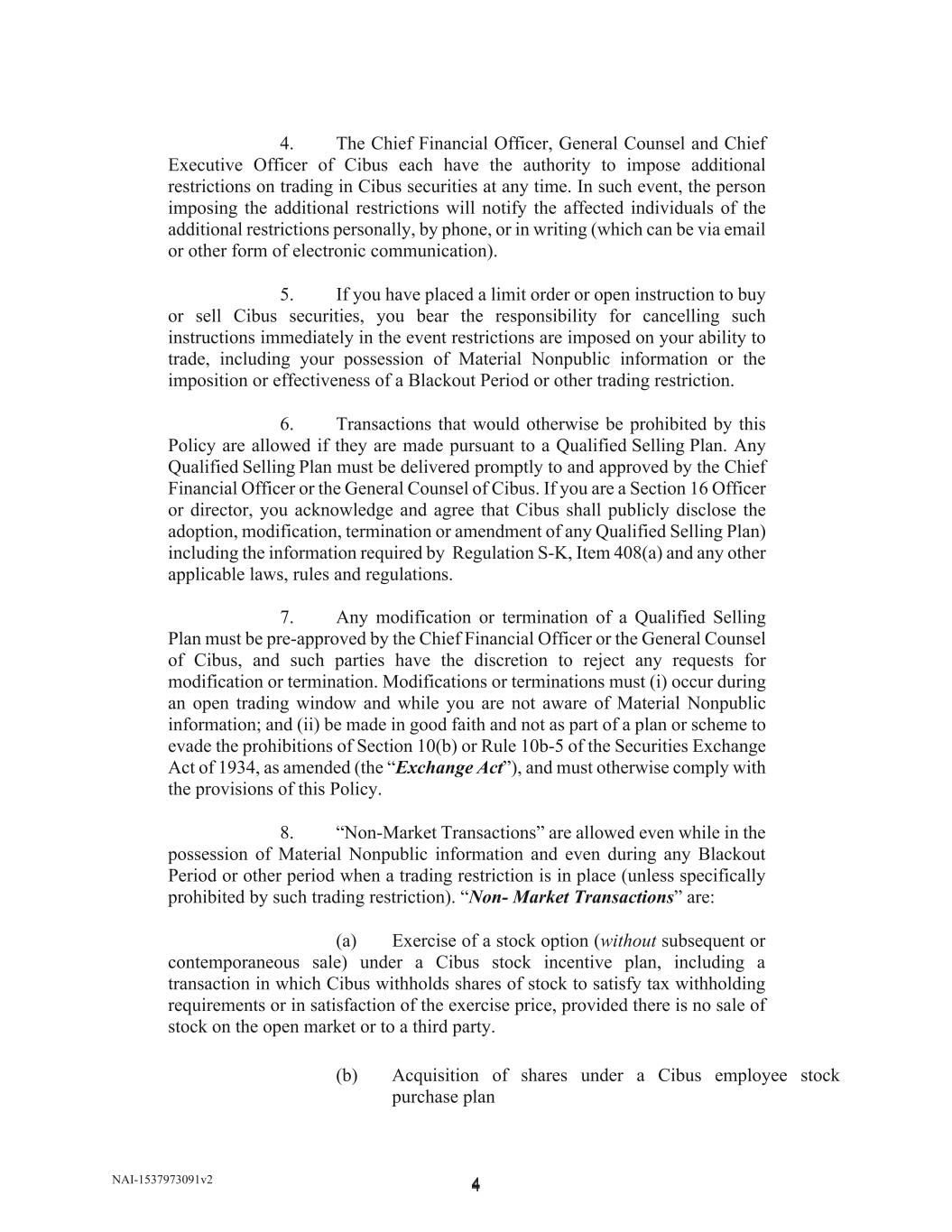
4 NAI-1537973091v2 4. The Chief Financial Officer, General Counsel and Chief Executive Officer of Cibus each have the authority to impose additional restrictions on trading in Cibus securities at any time. In such event, the person imposing the additional restrictions will notify the affected individuals of the additional restrictions personally, by phone, or in writing (which can be via email or other form of electronic communication). 5. If you have placed a limit order or open instruction to buy or sell Cibus securities, you bear the responsibility for cancelling such instructions immediately in the event restrictions are imposed on your ability to trade, including your possession of Material Nonpublic information or the imposition or effectiveness of a Blackout Period or other trading restriction. 6. Transactions that would otherwise be prohibited by this Policy are allowed if they are made pursuant to a Qualified Selling Plan. Any Qualified Selling Plan must be delivered promptly to and approved by the Chief Financial Officer or the General Counsel of Cibus. If you are a Section 16 Officer or director, you acknowledge and agree that Cibus shall publicly disclose the adoption, modification, termination or amendment of any Qualified Selling Plan) including the information required by Regulation S-K, Item 408(a) and any other applicable laws, rules and regulations. 7. Any modification or termination of a Qualified Selling Plan must be pre-approved by the Chief Financial Officer or the General Counsel of Cibus, and such parties have the discretion to reject any requests for modification or termination. Modifications or terminations must (i) occur during an open trading window and while you are not aware of Material Nonpublic information; and (ii) be made in good faith and not as part of a plan or scheme to evade the prohibitions of Section 10(b) or Rule 10b-5 of the Securities Exchange Act of 1934, as amended (the “Exchange Act”), and must otherwise comply with the provisions of this Policy. 8. “Non-Market Transactions” are allowed even while in the possession of Material Nonpublic information and even during any Blackout Period or other period when a trading restriction is in place (unless specifically prohibited by such trading restriction). “Non- Market Transactions” are: (a) Exercise of a stock option (without subsequent or contemporaneous sale) under a Cibus stock incentive plan, including a transaction in which Cibus withholds shares of stock to satisfy tax withholding requirements or in satisfaction of the exercise price, provided there is no sale of stock on the open market or to a third party. (b) Acquisition of shares under a Cibus employee stock purchase plan
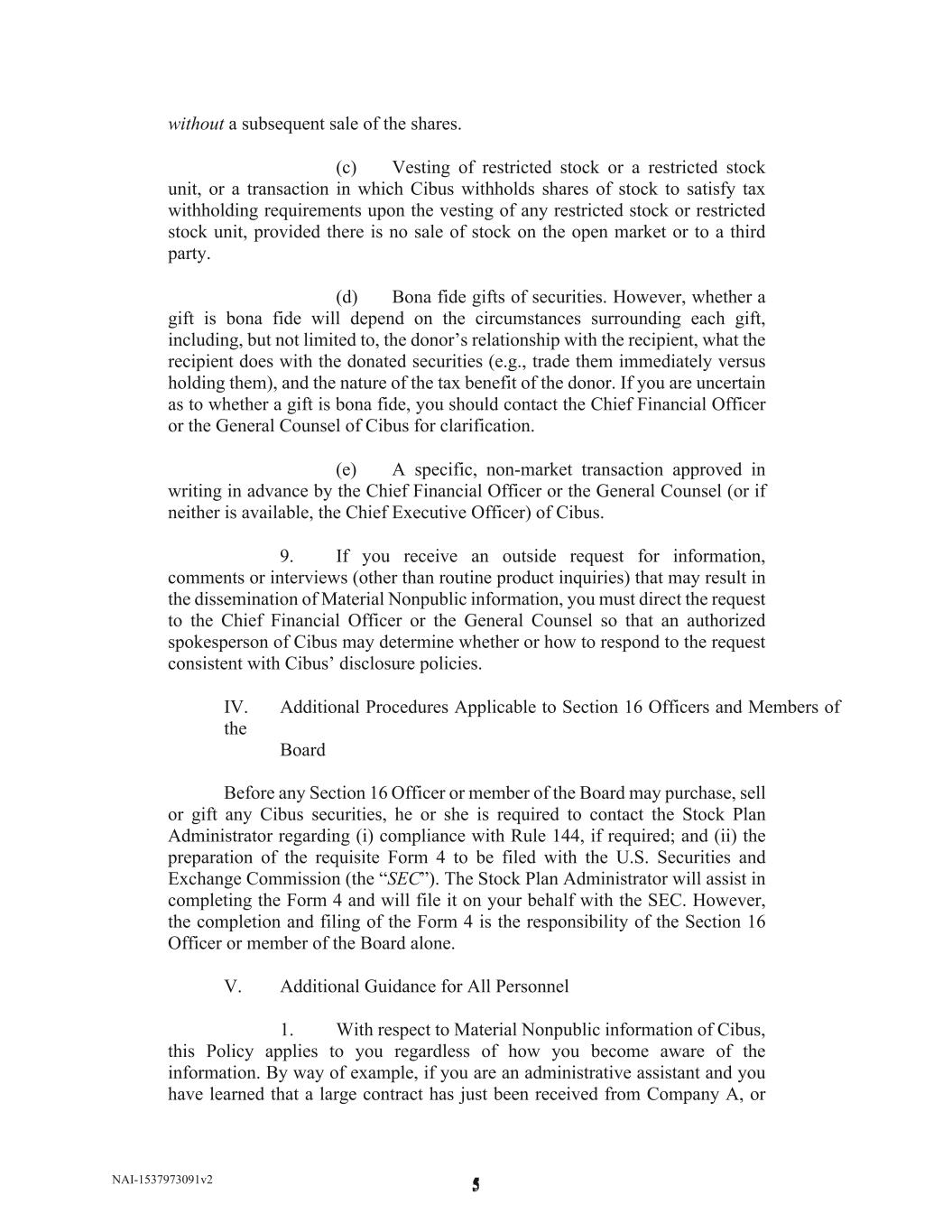
5 NAI-1537973091v2 without a subsequent sale of the shares. (c) Vesting of restricted stock or a restricted stock unit, or a transaction in which Cibus withholds shares of stock to satisfy tax withholding requirements upon the vesting of any restricted stock or restricted stock unit, provided there is no sale of stock on the open market or to a third party. (d) Bona fide gifts of securities. However, whether a gift is bona fide will depend on the circumstances surrounding each gift, including, but not limited to, the donor’s relationship with the recipient, what the recipient does with the donated securities (e.g., trade them immediately versus holding them), and the nature of the tax benefit of the donor. If you are uncertain as to whether a gift is bona fide, you should contact the Chief Financial Officer or the General Counsel of Cibus for clarification. (e) A specific, non-market transaction approved in writing in advance by the Chief Financial Officer or the General Counsel (or if neither is available, the Chief Executive Officer) of Cibus. 9. If you receive an outside request for information, comments or interviews (other than routine product inquiries) that may result in the dissemination of Material Nonpublic information, you must direct the request to the Chief Financial Officer or the General Counsel so that an authorized spokesperson of Cibus may determine whether or how to respond to the request consistent with Cibus’ disclosure policies. IV. Additional Procedures Applicable to Section 16 Officers and Members of the Board Before any Section 16 Officer or member of the Board may purchase, sell or gift any Cibus securities, he or she is required to contact the Stock Plan Administrator regarding (i) compliance with Rule 144, if required; and (ii) the preparation of the requisite Form 4 to be filed with the U.S. Securities and Exchange Commission (the “SEC”). The Stock Plan Administrator will assist in completing the Form 4 and will file it on your behalf with the SEC. However, the completion and filing of the Form 4 is the responsibility of the Section 16 Officer or member of the Board alone. V. Additional Guidance for All Personnel 1. With respect to Material Nonpublic information of Cibus, this Policy applies to you regardless of how you become aware of the information. By way of example, if you are an administrative assistant and you have learned that a large contract has just been received from Company A, or
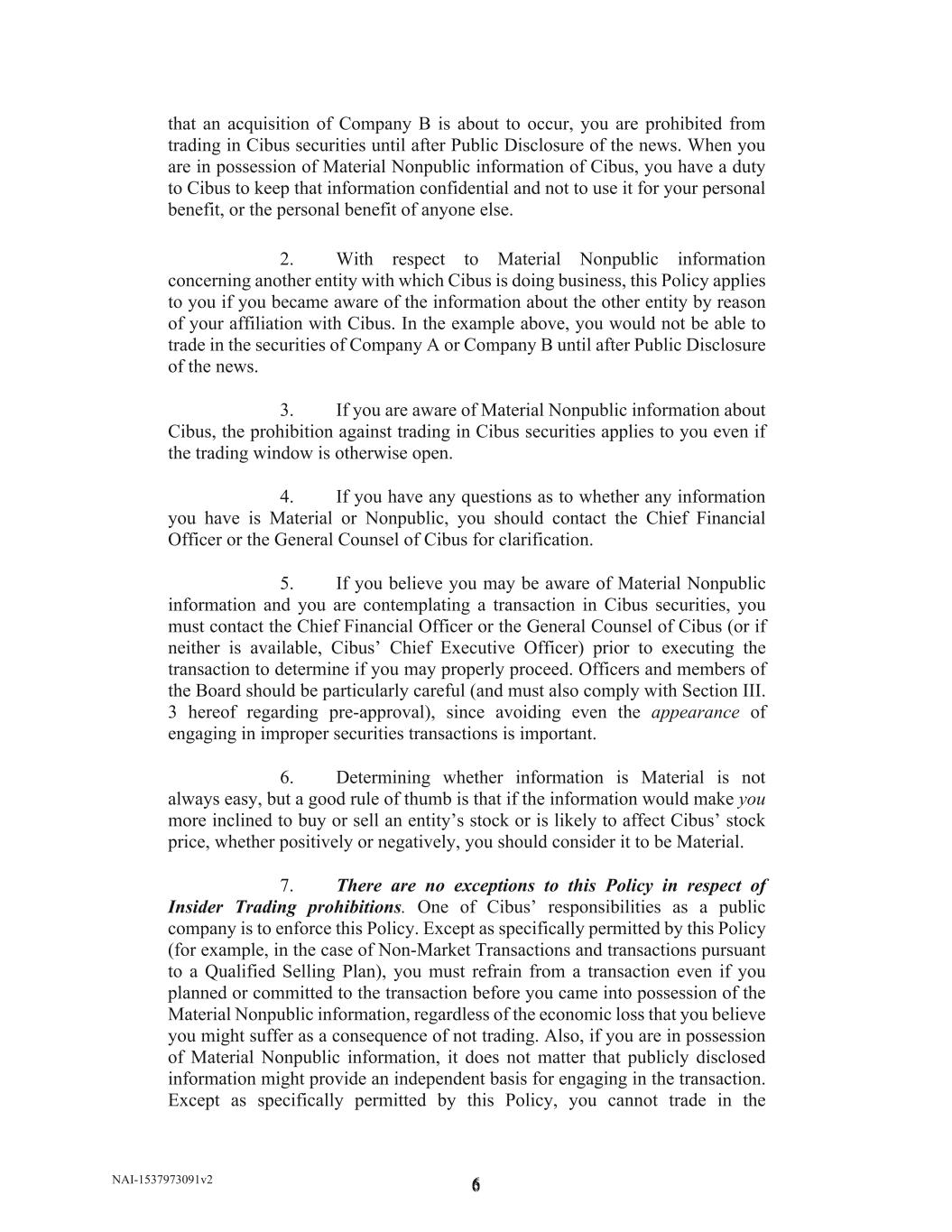
6 NAI-1537973091v2 that an acquisition of Company B is about to occur, you are prohibited from trading in Cibus securities until after Public Disclosure of the news. When you are in possession of Material Nonpublic information of Cibus, you have a duty to Cibus to keep that information confidential and not to use it for your personal benefit, or the personal benefit of anyone else. 2. With respect to Material Nonpublic information concerning another entity with which Cibus is doing business, this Policy applies to you if you became aware of the information about the other entity by reason of your affiliation with Cibus. In the example above, you would not be able to trade in the securities of Company A or Company B until after Public Disclosure of the news. 3. If you are aware of Material Nonpublic information about Cibus, the prohibition against trading in Cibus securities applies to you even if the trading window is otherwise open. 4. If you have any questions as to whether any information you have is Material or Nonpublic, you should contact the Chief Financial Officer or the General Counsel of Cibus for clarification. 5. If you believe you may be aware of Material Nonpublic information and you are contemplating a transaction in Cibus securities, you must contact the Chief Financial Officer or the General Counsel of Cibus (or if neither is available, Cibus’ Chief Executive Officer) prior to executing the transaction to determine if you may properly proceed. Officers and members of the Board should be particularly careful (and must also comply with Section III. 3 hereof regarding pre-approval), since avoiding even the appearance of engaging in improper securities transactions is important. 6. Determining whether information is Material is not always easy, but a good rule of thumb is that if the information would make you more inclined to buy or sell an entity’s stock or is likely to affect Cibus’ stock price, whether positively or negatively, you should consider it to be Material. 7. There are no exceptions to this Policy in respect of Insider Trading prohibitions. One of Cibus’ responsibilities as a public company is to enforce this Policy. Except as specifically permitted by this Policy (for example, in the case of Non-Market Transactions and transactions pursuant to a Qualified Selling Plan), you must refrain from a transaction even if you planned or committed to the transaction before you came into possession of the Material Nonpublic information, regardless of the economic loss that you believe you might suffer as a consequence of not trading. Also, if you are in possession of Material Nonpublic information, it does not matter that publicly disclosed information might provide an independent basis for engaging in the transaction. Except as specifically permitted by this Policy, you cannot trade in the
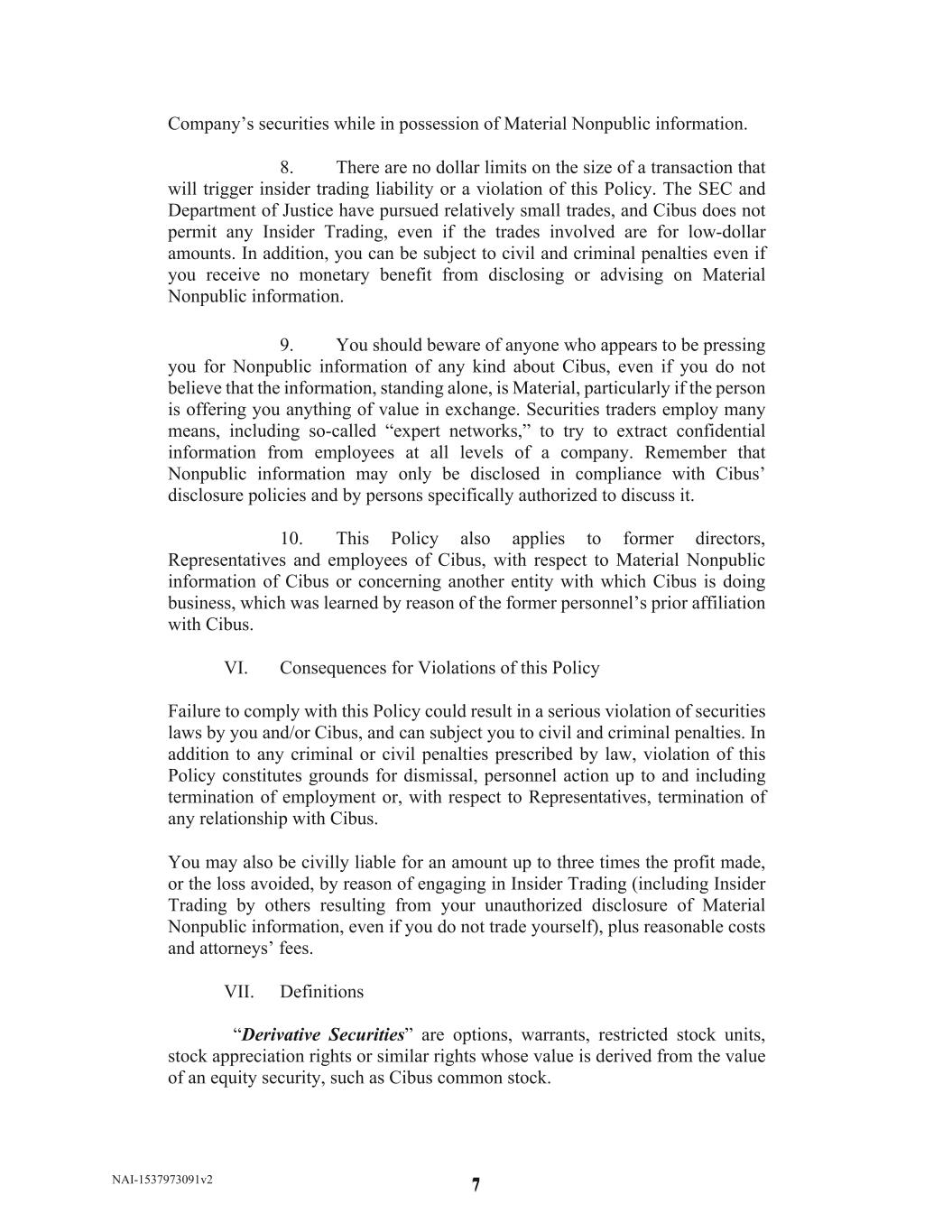
7 NAI-1537973091v2 Company’s securities while in possession of Material Nonpublic information. 8. There are no dollar limits on the size of a transaction that will trigger insider trading liability or a violation of this Policy. The SEC and Department of Justice have pursued relatively small trades, and Cibus does not permit any Insider Trading, even if the trades involved are for low-dollar amounts. In addition, you can be subject to civil and criminal penalties even if you receive no monetary benefit from disclosing or advising on Material Nonpublic information. 9. You should beware of anyone who appears to be pressing you for Nonpublic information of any kind about Cibus, even if you do not believe that the information, standing alone, is Material, particularly if the person is offering you anything of value in exchange. Securities traders employ many means, including so-called “expert networks,” to try to extract confidential information from employees at all levels of a company. Remember that Nonpublic information may only be disclosed in compliance with Cibus’ disclosure policies and by persons specifically authorized to discuss it. 10. This Policy also applies to former directors, Representatives and employees of Cibus, with respect to Material Nonpublic information of Cibus or concerning another entity with which Cibus is doing business, which was learned by reason of the former personnel’s prior affiliation with Cibus. VI. Consequences for Violations of this Policy Failure to comply with this Policy could result in a serious violation of securities laws by you and/or Cibus, and can subject you to civil and criminal penalties. In addition to any criminal or civil penalties prescribed by law, violation of this Policy constitutes grounds for dismissal, personnel action up to and including termination of employment or, with respect to Representatives, termination of any relationship with Cibus. You may also be civilly liable for an amount up to three times the profit made, or the loss avoided, by reason of engaging in Insider Trading (including Insider Trading by others resulting from your unauthorized disclosure of Material Nonpublic information, even if you do not trade yourself), plus reasonable costs and attorneys’ fees. VII. Definitions “Derivative Securities” are options, warrants, restricted stock units, stock appreciation rights or similar rights whose value is derived from the value of an equity security, such as Cibus common stock.
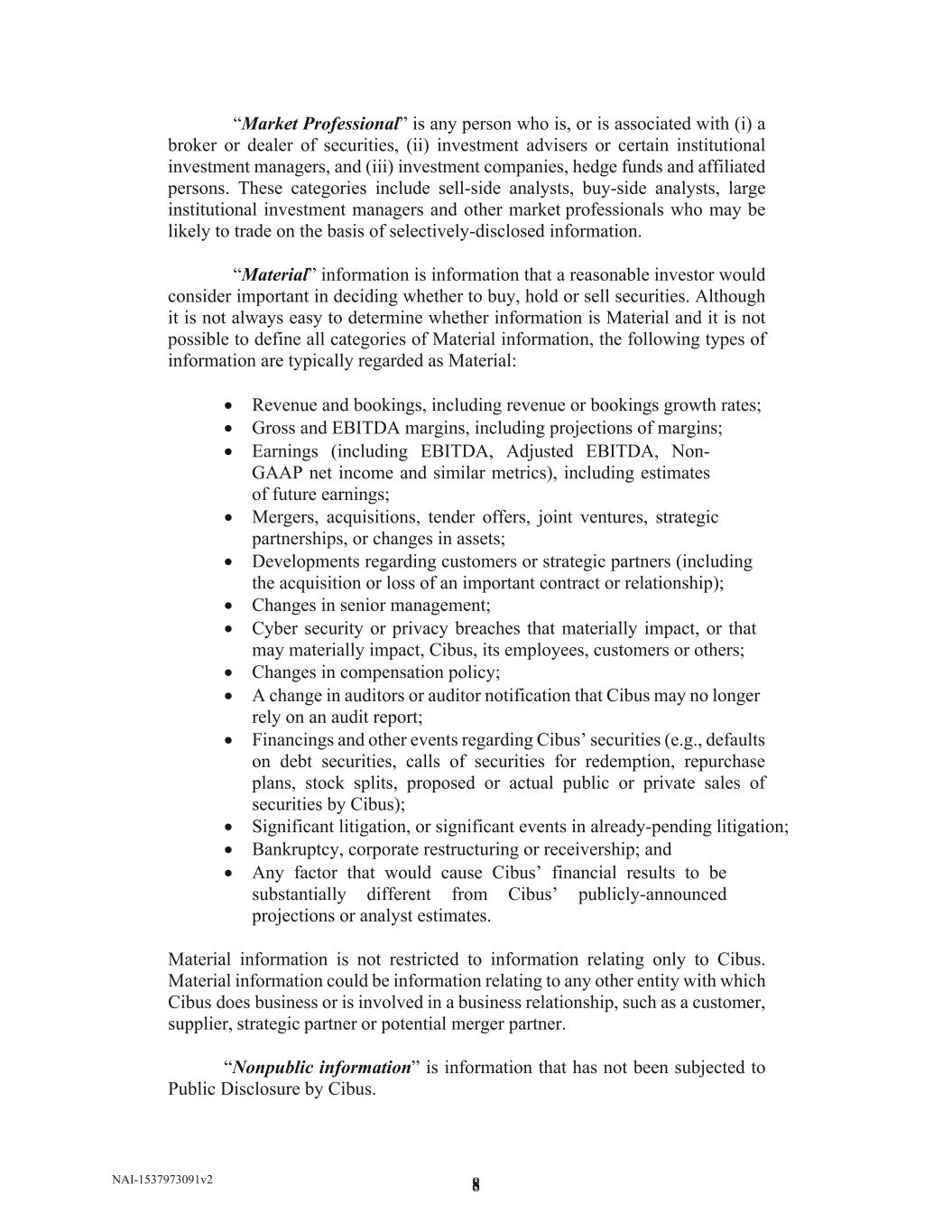
8 NAI-1537973091v2 “Market Professional” is any person who is, or is associated with (i) a broker or dealer of securities, (ii) investment advisers or certain institutional investment managers, and (iii) investment companies, hedge funds and affiliated persons. These categories include sell-side analysts, buy-side analysts, large institutional investment managers and other market professionals who may be likely to trade on the basis of selectively-disclosed information. “Material” information is information that a reasonable investor would consider important in deciding whether to buy, hold or sell securities. Although it is not always easy to determine whether information is Material and it is not possible to define all categories of Material information, the following types of information are typically regarded as Material: Revenue and bookings, including revenue or bookings growth rates; Gross and EBITDA margins, including projections of margins; Earnings (including EBITDA, Adjusted EBITDA, Non- GAAP net income and similar metrics), including estimates of future earnings; Mergers, acquisitions, tender offers, joint ventures, strategic partnerships, or changes in assets; Developments regarding customers or strategic partners (including the acquisition or loss of an important contract or relationship); Changes in senior management; Cyber security or privacy breaches that materially impact, or that may materially impact, Cibus, its employees, customers or others; Changes in compensation policy; A change in auditors or auditor notification that Cibus may no longer rely on an audit report; Financings and other events regarding Cibus’ securities (e.g., defaults on debt securities, calls of securities for redemption, repurchase plans, stock splits, proposed or actual public or private sales of securities by Cibus); Significant litigation, or significant events in already-pending litigation; Bankruptcy, corporate restructuring or receivership; and Any factor that would cause Cibus’ financial results to be substantially different from Cibus’ publicly-announced projections or analyst estimates. Material information is not restricted to information relating only to Cibus. Material information could be information relating to any other entity with which Cibus does business or is involved in a business relationship, such as a customer, supplier, strategic partner or potential merger partner. “Nonpublic information” is information that has not been subjected to Public Disclosure by Cibus.
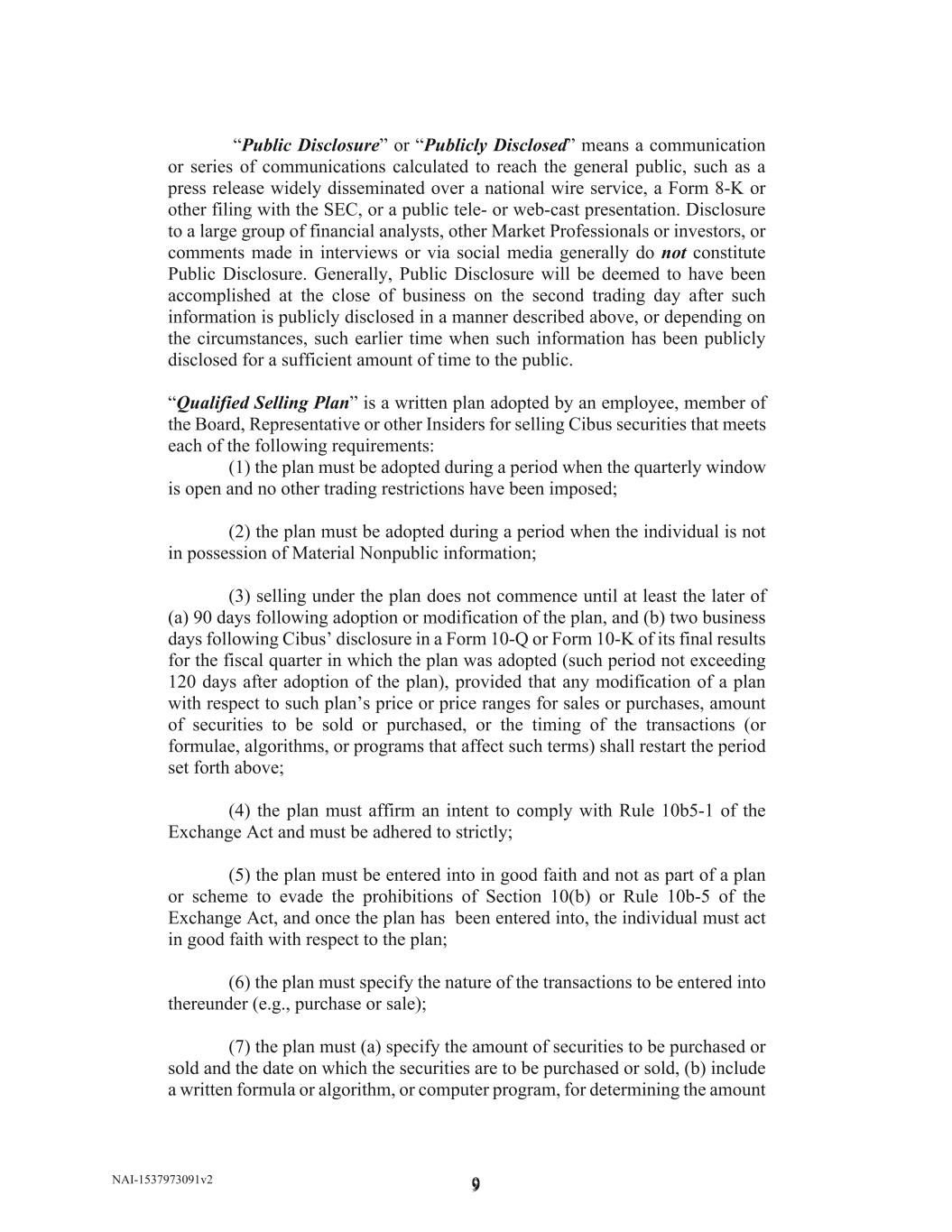
9 NAI-1537973091v2 “Public Disclosure” or “Publicly Disclosed” means a communication or series of communications calculated to reach the general public, such as a press release widely disseminated over a national wire service, a Form 8-K or other filing with the SEC, or a public tele- or web-cast presentation. Disclosure to a large group of financial analysts, other Market Professionals or investors, or comments made in interviews or via social media generally do not constitute Public Disclosure. Generally, Public Disclosure will be deemed to have been accomplished at the close of business on the second trading day after such information is publicly disclosed in a manner described above, or depending on the circumstances, such earlier time when such information has been publicly disclosed for a sufficient amount of time to the public. “Qualified Selling Plan” is a written plan adopted by an employee, member of the Board, Representative or other Insiders for selling Cibus securities that meets each of the following requirements: (1) the plan must be adopted during a period when the quarterly window is open and no other trading restrictions have been imposed; (2) the plan must be adopted during a period when the individual is not in possession of Material Nonpublic information; (3) selling under the plan does not commence until at least the later of (a) 90 days following adoption or modification of the plan, and (b) two business days following Cibus’ disclosure in a Form 10-Q or Form 10-K of its final results for the fiscal quarter in which the plan was adopted (such period not exceeding 120 days after adoption of the plan), provided that any modification of a plan with respect to such plan’s price or price ranges for sales or purchases, amount of securities to be sold or purchased, or the timing of the transactions (or formulae, algorithms, or programs that affect such terms) shall restart the period set forth above; (4) the plan must affirm an intent to comply with Rule 10b5-1 of the Exchange Act and must be adhered to strictly; (5) the plan must be entered into in good faith and not as part of a plan or scheme to evade the prohibitions of Section 10(b) or Rule 10b-5 of the Exchange Act, and once the plan has been entered into, the individual must act in good faith with respect to the plan; (6) the plan must specify the nature of the transactions to be entered into thereunder (e.g., purchase or sale); (7) the plan must (a) specify the amount of securities to be purchased or sold and the date on which the securities are to be purchased or sold, (b) include a written formula or algorithm, or computer program, for determining the amount
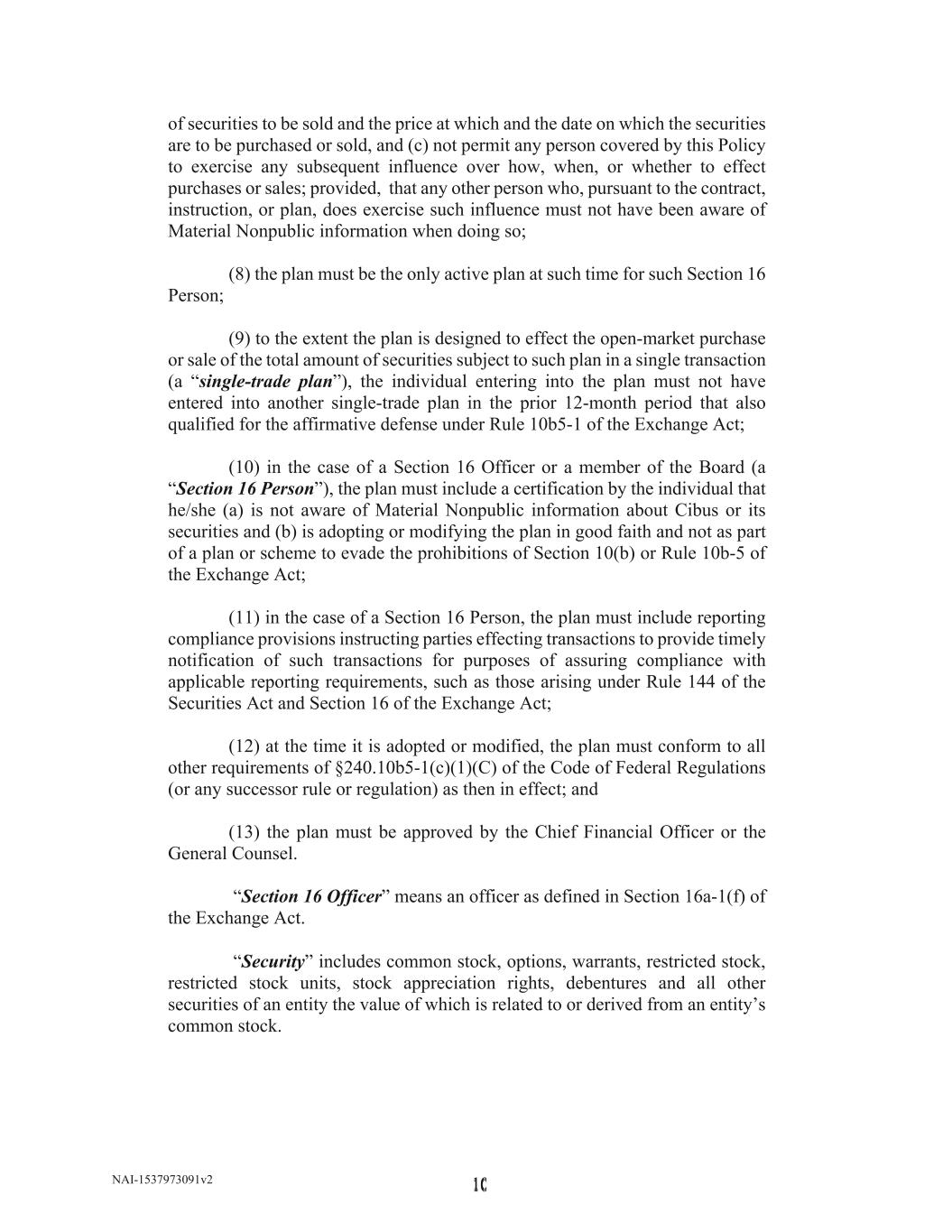
10NAI-1537973091v2 of securities to be sold and the price at which and the date on which the securities are to be purchased or sold, and (c) not permit any person covered by this Policy to exercise any subsequent influence over how, when, or whether to effect purchases or sales; provided, that any other person who, pursuant to the contract, instruction, or plan, does exercise such influence must not have been aware of Material Nonpublic information when doing so; (8) the plan must be the only active plan at such time for such Section 16 Person; (9) to the extent the plan is designed to effect the open-market purchase or sale of the total amount of securities subject to such plan in a single transaction (a “single-trade plan”), the individual entering into the plan must not have entered into another single-trade plan in the prior 12-month period that also qualified for the affirmative defense under Rule 10b5-1 of the Exchange Act; (10) in the case of a Section 16 Officer or a member of the Board (a “Section 16 Person”), the plan must include a certification by the individual that he/she (a) is not aware of Material Nonpublic information about Cibus or its securities and (b) is adopting or modifying the plan in good faith and not as part of a plan or scheme to evade the prohibitions of Section 10(b) or Rule 10b-5 of the Exchange Act; (11) in the case of a Section 16 Person, the plan must include reporting compliance provisions instructing parties effecting transactions to provide timely notification of such transactions for purposes of assuring compliance with applicable reporting requirements, such as those arising under Rule 144 of the Securities Act and Section 16 of the Exchange Act; (12) at the time it is adopted or modified, the plan must conform to all other requirements of §240.10b5-1(c)(1)(C) of the Code of Federal Regulations (or any successor rule or regulation) as then in effect; and (13) the plan must be approved by the Chief Financial Officer or the General Counsel. “Section 16 Officer” means an officer as defined in Section 16a-1(f) of the Exchange Act. “Security” includes common stock, options, warrants, restricted stock, restricted stock units, stock appreciation rights, debentures and all other securities of an entity the value of which is related to or derived from an entity’s common stock.
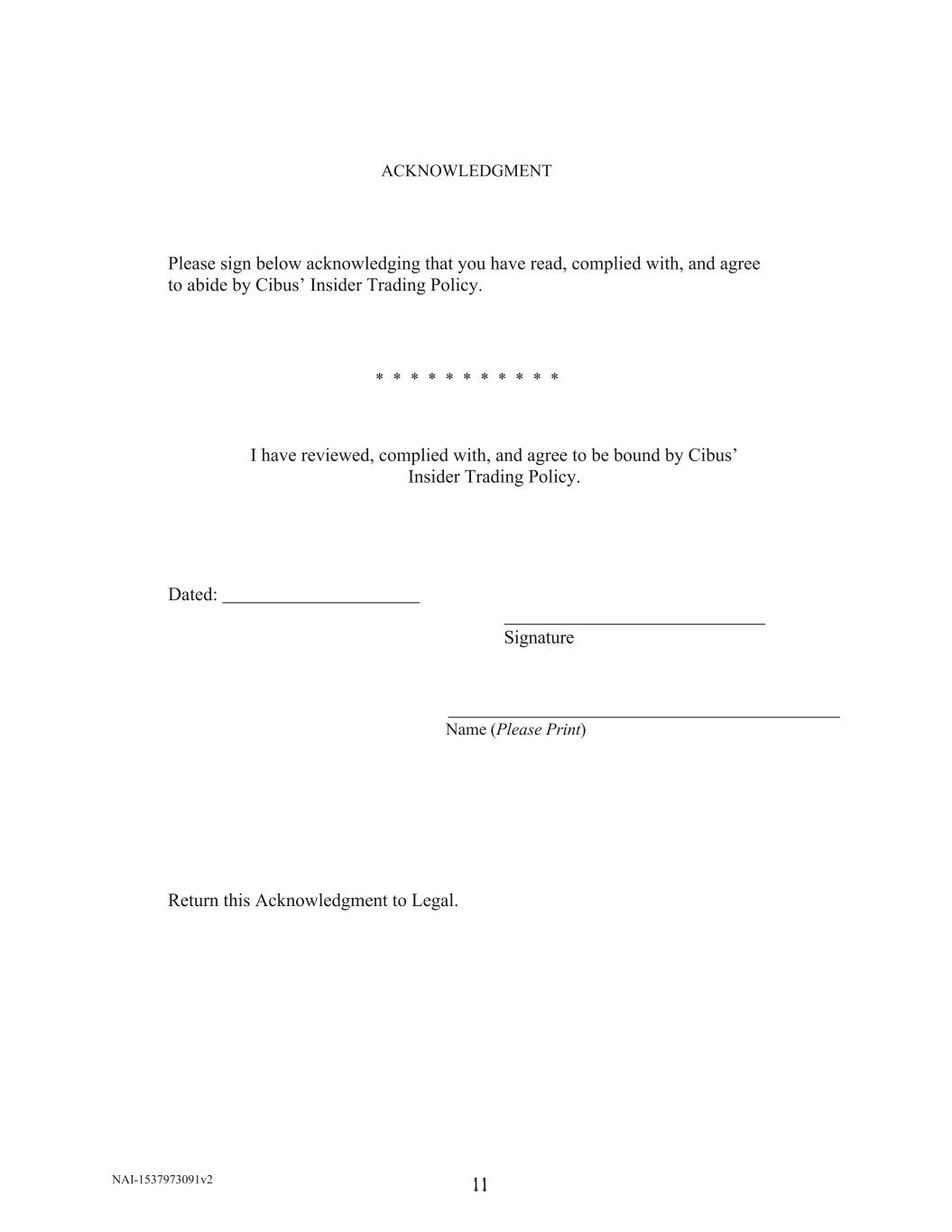
11NAI-1537973091v2 ACKNOWLEDGMENT Please sign below acknowledging that you have read, complied with, and agree to abide by Cibus’ Insider Trading Policy. * * * * * * * * * * * I have reviewed, complied with, and agree to be bound by Cibus’ Insider Trading Policy. Dated: Signature Name (Please Print) Return this Acknowledgment to Legal.